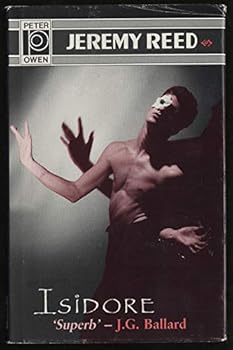Isidore: A Novel About the Comte De Lautreamont
Select Format
Select Condition 
Book Overview
An imaginative novel recreating the life of Isidore Ducasse, The self-styled Comte de Lautreamont who he died under mysterious circumstances in 1871. He left almost no clues to his existence, except the explosive, astonishing prose poem, Les Chants d
Format:Hardcover
Language:English
ISBN:0720608317
ISBN13:9780720608311
Release Date:November 1992
Publisher:Peter Owen Ltd
Length:150 Pages
Weight:0.70 lbs.
Dimensions:8.8" x 0.8" x 5.8"
Customer Reviews
2 ratings
reed does it again
Published by Thriftbooks.com User , 24 years ago
this fictitious yet engrossing and beautifully written biography of young isidore ducasse, the comte de lautreamont, author of the bizarre and slightly twisted "maldoror" and surrealist precursor par excellance (perhaps even surpassing rimbaud?), will keep the imaginative reader riveted and glued to it from start to finish. reed has an uncanny ability to 'hit the nail on the head', and we (or at least I) always get the sense that his portrayals of his poetic idols and heroes are not that far off the mark, although there is no way to know this to a certainty. we do know that lautreamont was a withdrawn, odd youth who frightened his classmates, very rarely spoke, and had virtually no companions either at the lycee or in paris, where he was to die at age 24. reed's ducasse is a rebellious, brilliant, and poetic genius with lofty feelings of contempt for humanity and a love for the creative imagination, which allows man to transform the banality and monotony of dull everyday reality into something more beautiful and aesthetic. and all of it comes off smoothly, never becoming pretentious or too fanciful. the only weakness lies in reed's botched attempts to explore 'the duality of identity', and explore lautreamont's supposedly schizophrenic nature. to my mind this assists in perpetuating false myths about the author which cannot be verified in any way whatever. from ducasse's letters to his father, his banker, etc, we see not the dionysian monster maldoror but a young man quite capable of being cool, rational, socially interactive and charming. not one word betrays even a touch of mental disturbance or inadaptability. it occasionally seems like reed is trying to imply that because he used a pseudonym to write maldoror, he was almost certainly a nutjob with two personalities tearing one another part. of course, this is entirely possible, but from the "poesies" and the aforementioned letters, it seems more likely than not that ducasse was provoking the writer by writing two such opposed and outrageously contradictory works, and it is quite an assumption indeed to read a great deal of neurosis or impending insanity into it. but other than that, this book is, as it says on the back cover, "an electric testament to the imagination", and anyone even mildly interested in surrealist literature should grab it immediately. another victory for reed.
An intriguing fictional biography.
Published by Thriftbooks.com User , 29 years ago
Biographical information about the elusive Isidore Ducasse, a writer whom Andre Breton referred to as "a contemporary, one who was among us, yet we know less about him than we do about Dante, Shakespeare or Homer," is sketchy at best. This makes Reed's novel a risky venture, while at the same time leaving him a great deal of imaginative freedom. His writing is so compelling, and the voice of Ducasse, also known as le Comte de Lautreamont, so strong, that at times you'll find yourself thinking, This is the way it must have happened.





